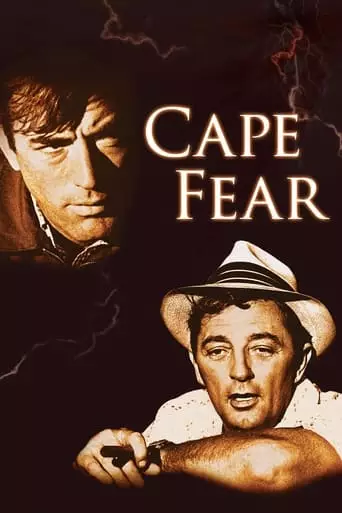Sam Bowden witnesses a rape committed by Max Cady and testifies against him. When released after 8 years in prison, Cady begins stalking Bowden and his family but is always clever enough not to violate the law.
Cape Fear is a psychological thriller directed by J. Lee Thompson, featuring Gregory Peck as Sam Bowden, a lawyer, and Robert Mitchum as Max Cady, a menacing ex-convict. The narrative unfolds as Cady, after serving an eight-year prison sentence for the rape of a young girl, seeks revenge against Bowden, who had testified against him during the trial. Upon his release, Cady begins to stalk Bowden’s family, employing intimidation and terror to exact his vengeance.
The film delves into themes of justice, morality, and the psychological impact of fear. Bowden’s initial reliance on legal measures to protect his family gradually shifts towards more personal and violent means as Cady’s threats escalate. This transformation highlights the moral complexities individuals face when confronting evil. The tension between the law’s limitations and personal responsibility is a central element of the narrative.
Main Themes in Cape Fear (1962)
- Justice and Morality: The film explores the conflict between legal justice and personal morality. Bowden’s decision to testify against Cady is rooted in his belief in the law, yet he is forced to confront the limitations of the legal system when it fails to protect his family. This theme raises questions about the effectiveness of the justice system and the moral compromises individuals make when seeking retribution.
- Fear and Paranoia: Cady’s relentless pursuit of Bowden’s family instills a profound sense of fear and paranoia. The film masterfully portrays how fear can infiltrate every aspect of daily life, affecting the family’s sense of safety and trust. This theme underscores the psychological terror that accompanies being stalked by a malevolent force.
- Revenge and Retribution: Cady’s quest for revenge is central to the plot, driving the narrative forward. His actions are a response to his perception of injustice, and the film examines the destructive nature of vengeance. It questions whether retribution can ever truly satisfy the desire for justice or if it perpetuates a cycle of violence.
- The Duality of Human Nature: The characters in Cape Fear embody the duality of human nature. Bowden, a lawyer committed to upholding the law, is forced to confront his darker instincts as he resorts to violence to protect his family. Cady, though a criminal, is portrayed with a complexity that challenges the audience to consider the circumstances that shape an individual’s actions.
Impact of Cape Fear (1962)
Upon its release, Cape Fear received critical acclaim for its intense storytelling and compelling performances, particularly by Robert Mitchum, whose portrayal of Max Cady is often cited as one of the most menacing in cinematic history. The film’s exploration of psychological terror and moral ambiguity set a new standard for thrillers, influencing countless films in the genre. Its success led to a 1991 remake directed by Martin Scorsese, starring Robert De Niro as Cady, which further cemented the original’s legacy in popular culture.
7 Reasons to Watch Cape Fear (1962)
- Masterful Direction: J. Lee Thompson’s direction crafts a taut and suspenseful narrative that keeps viewers on the edge of their seats. His ability to build tension and create a menacing atmosphere is a testament to his skill as a filmmaker.
- Outstanding Performances: The film features stellar performances, especially by Robert Mitchum, whose portrayal of Max Cady is chilling and unforgettable. Gregory Peck delivers a nuanced performance as Sam Bowden, capturing the character’s internal conflict and determination.
- Psychological Depth: Cape Fear delves deep into the psychology of its characters, particularly the antagonist. The film explores themes of guilt, revenge, and the human capacity for evil, offering a complex and thought-provoking narrative.
- Atmospheric Cinematography: The cinematography effectively conveys the film’s dark and suspenseful tone. The use of shadows and lighting enhances the sense of dread and unease, immersing the audience in the story’s tension.
- Influential Storytelling: As a precursor to many psychological thrillers, Cape Fear set a benchmark for the genre. Its impact is evident in numerous films that followed, drawing inspiration from its narrative structure and character development.
- Timeless Themes: The exploration of justice, morality, and fear remains relevant, making the film’s themes timeless. Its examination of human nature and the complexities of right and wrong continues to resonate with audiences.
- Critical Acclaim: The film has been praised by critics and audiences alike for its storytelling and performances. It holds a strong reputation in cinematic history, often cited as a classic in the thriller genre.
How Will You Feel After Watching Cape Fear (1962)?
Watching Cape Fear is an emotionally intense experience that leaves a lasting impression. The film’s relentless suspense and psychological depth will likely evoke a range of emotions, from fear and anxiety to contemplation and introspection.
The portrayal of Max Cady’s menacing presence is likely to instill a sense of unease, making viewers acutely aware of the fragility of safety and the potential for evil in the world. The film’s exploration of moral dilemmas may prompt viewers to reflect on their own beliefs about justice and retribution.
The resolution of the narrative, while providing closure, may also leave viewers with lingering questions about the nature of evil and the lengths one is willing to go to protect loved ones. The film’s ability to provoke such deep reflection is a testament to its storytelling prowess.
In summary, Cape Fear offers a compelling and thought-provoking cinematic experience that challenges viewers to confront uncomfortable truths about human nature and the complexities of morality. Its enduring impact and critical acclaim underscore its significance in the thriller genre.

